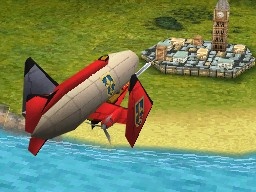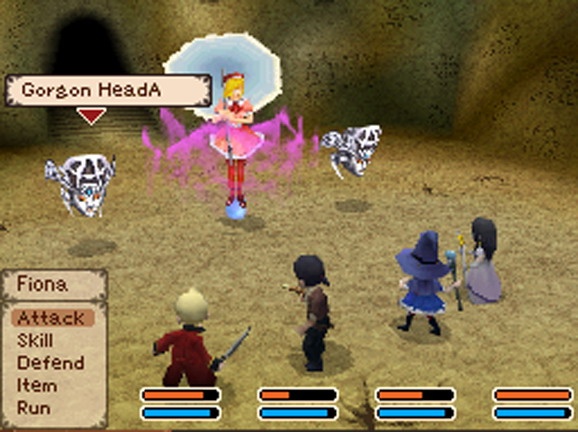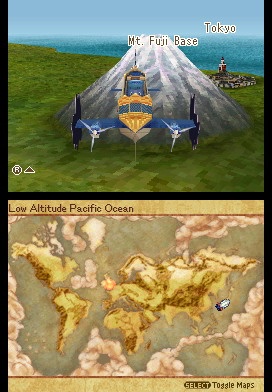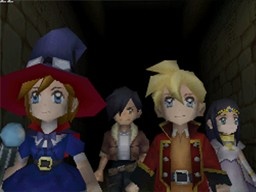The thrill of Nostalgia is exploring an alternate Earth where airships and adventurers clash with demons and ancient cabals. This Japanese role-playing game's magical version of 19th-century Earth is packed with daring heroes and powerful evil, and you're thrown into the mix as the young son of a famous adventurer. Unfortunately, the gameplay itself is as archaic as anything from the 19th century. Despite an interesting split between airship-based and on-foot encounters, the simplistic, too-easy combat brings Nostalgia down to earth all too quickly.

You play as London native Eddie Brown, son of the famous and suddenly missing adventurer Gilbert Brown. Your first task is to find your father by taking to the skies in his airship, the Maverick. Eddie's barely 16, but he's ready for adventure. He has trained in swordplay since he was a child--he is an adventurer's son, after all. As your search for your father becomes a world-spanning quest against the mysterious Ancient Father's Cabal, more friends join your party. Pad is another young man from London, a quick gunslinger to counter Eddie's strong sword arm. Melody is a young witch, pointy hat and all, and provides magical offense. The last party member is the mysterious Fiona, a healer who doesn't recall anything of her own history--anything other than Eddie's father rescuing her, just before he vanished.
Fiona is the key to capturing mysterious items of power scattered across the world, items the Ancient Father's Cabal is willing to kill for. Your pursuit of these items takes you through the main story arc and around the world. From London, you'll set off for the metropolises of Cairo, St. Petersburg, Delhi, Tokyo, New York, and Rio de Janeiro. Although you start your adventure clearing the sewers of London from a scourge of rats, Nostalgia's ambition is to immerse you into an unimaginably vast and fantastic world. Not long after fighting rats, you're questing through exotic locations like Mount Ararat, the Tower of Babel, and El Dorado, the City of Gold.
There is no traditional overworld, on-foot travel in Nostalgia; when you're not in a city or dungeon, you're in your airship. In the air, each character mans a unique weapon and calls upon a unique skill set, distinct but similar to their on-foot skills. Eddie is your primary damage dealer, Pad is the support and evasion fighter, Melody is the magical attacker, and Fiona is your healer. As you advance through the game, the airship gains the ability to rise up from the default low altitude to medium and high altitudes. The higher you go, the faster you travel and the more types of terrain you can cross. The heavens aren't safe, though. The higher altitudes also harbor more dangerous enemy airships and monsters.

Land and air conflicts unfold in turn-based combat. Random encounters scattered across the map plunge you into battle with cultists, alligators, demons, ghosts, and more. There's a delightful variety of enemies available for you to shoot, stab, and magically fry, but it's also in combat that the first cracks in the veneer of Nostalgia's charm start to show. Ground combat is incredibly simplistic and has no meaningful strategy to learn. Enemies don't do enough damage to ever pose much of a threat in a fight, and you make so much money adventuring that you should always have plenty of cheap health and magic potions to heal with between fights. Some enemies can inflict classic status conditions like confusion or paralysis, but it's rarely worth the effort to remove the status condition instead of simply continuing to pound on the enemies. The only skills of import are Eddie's brutal combo attack, his ability to raise attack power, and Fiona's healing. Not even boss fights pose any substantial challenge. There's no real satisfaction to winning fights by simply hitting the attack button often.
Air combat can be more difficult as you get the ability to gain altitude. The damage output of enemies rises drastically when you go from low to medium or medium to high altitude. In addition, the two airship conditions--fire and electrocution--can be devastating. Fire drains a substantial chunk of your hit points during each character's turn, and electrocution simply removes turns from you. But if you prepare for your ascension by buying a higher tier of healing items, combat still ultimately breaks down to your willingness to attack often and heal occasionally. Although there is plenty of combat on foot and in the air, it's all as light and insubstantial as cotton candy.
Exploring the skill grid is a delightful way to spend your hard-earned skill points. Some skills, particularly the end-game's co-op super attacks, are unlocked only by reaching a certain story point. However, most are unlocked by spending the skill points you earn in battle. Each character has two unique skill grids: one for ground battle and one for his or her post in the Maverick (and its successor). Unlocking one of Eddie's upgraded special attacks might only require pouring points into the earlier version of the attack, whereas upgrading a magical superpower might require upgrading all four elemental multitarget attack spells that Melody has. Spending your combat-earned skill points to open up new abilities is one of the more entertaining elements in the game. Sadly, that entertainment is undercut by the fact that most skills aren't worth the effort it takes to unlock them. Anything other than efficient healing or higher damage is of meager value at best.

Simple combat would be an excusable crutch for an excellent world and story. Unfortunately, just as Nostalgia's many skills veil a combat system that requires no expertise, Nostalgia's glamour of world-hopping travel and exotic dungeons veils a dull reality. Tokyo has different background music and a few different pieces of dialogue than London, and in New York you can buy armored wings for the Maverick that have US flags on them. But the same stores exist in every city, always offering slight improvements to your weapons and armor and a chance to replenish supplies. These aren't cities. They're merely places to push you toward your next destination. If anything, Nostalgia captures the dim fatigue of the constant traveler: every place looks the same, even if the airports have different elevator music.
The story proceeds at that same laggardly pace. Typically, you get a mission from one of the important non-player characters in London, sending you to another of the game's far-off regions. You'll usually be threatened by a vaguely ethnic Ancient Father's Cabal villain, such as the evil samurai in the dungeon hidden in a volcanic Mount Fuji. Each villain mocks you and claims you're too young to ever defeat his awful power. Then you fight through his dungeon and defeat him, he exclaims his disbelief that this could ever happen, and you head back to London to get your next mission. In theory, you're saving the world from the evil Cabal, and they all certainly seem to be bad people. But they're villains in the tradition of Snidely Whiplash. There's no explanation or reason to their evil. The Ancient Father's Cabal is simply bad so that the good guys have someone to unite against. With stronger writing and a more believable world to threaten, the Ancient Father's Cabal could have been classic villains. Instead, they twirl their mustaches and sneer as you ride in to defeat them.
Lastly, most cities also have an Adventurer's Guild. The Adventurer's Guild is cleverly integrated into the world as a clearinghouse of heroes-for-hire. Princes and paupers alike can request an adventurer to complete some task for them, and those requests become side quests for you to pursue. Each quest earns you points. Those points help you advance your guild rank, and with higher rank comes more dangerous and rewarding quests. Eventually, these quests become optional boss fights and other interesting tasks. Unfortunately, far too many of them are simply fetch quests, sending you back into dungeons you've completed in the main storyline. Worse, initially you can take on only one quest at a time, and completing your quests requires traveling back to an Adventurer's Guild to turn it in. So doing side quests doesn't just involve going back to dungeons you've already cleared and searching them from top to bottom; it involves doing that over and over…and over. Of course, all that adventuring earns you even more gold, experience, and skills. That would be great if the game were challenging, but pursuing these side missions only makes the game more lopsidedly easy.

Nostalgia is charming. The graphics are bright and move crisply, and the inspiring character design rises above the game's other issues. Each character has an interesting look that seems appropriate for the world Nostalgia occupies. The sound design isn't as inspired, but the audio clearly communicates whether you're in a fight, in a dungeon, in a town, or on your airship. Nostalgia's creators have a lot of experience working on the DS platform, and their technical proficiency shows.
There is a virtue to accessibility and ease of play, and Nostalgia could be an excellent product for a young gamer who doesn't need combat with any more depth than pressing "attack" and remembering to heal. The players who are going to enjoy this game don't need a world so detailed that they might actually get lost while exploring and they also don't need villains who are more than simply whipping boys for a "save the world" plot's needs. For anyone who seeks depth or challenge, though, Nostalgia simply never takes off.